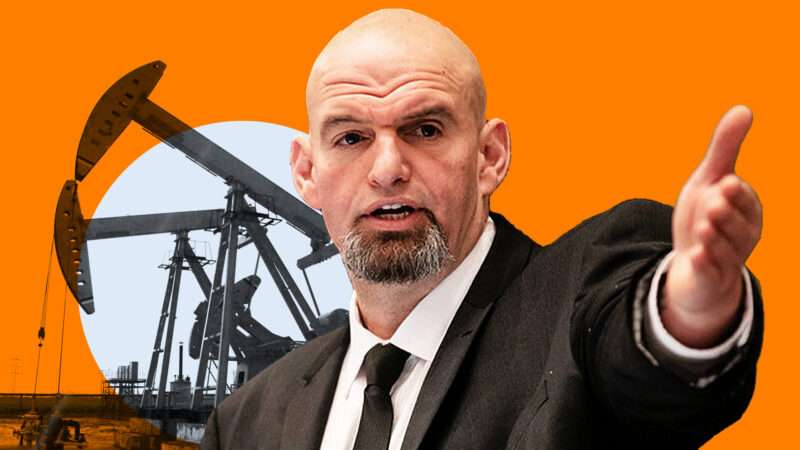
Pennsylvania Lt. Gov. John Fetterman is locked in a heated Senate race against former television host Dr. Mehmet Oz. Despite being sidelined from the campaign trail by a stroke right before his May primary victory, Fetterman has kept his opponent on defense with a constant stream of memes portraying Oz as an out-of-touch, out-of-state elite.
Now, Fetterman is trying a new tactic: weaponizing law enforcement against business leaders he doesn't like.
In an op-ed posted in the Wilkes-Barre Times Leader, Fetterman laid out a series of policy proposals. Like many politicians of recent years, both Democratic and Republican, Fetterman advocates a "Buy American" standard of "mandating that companies we buy from make their products right here at home."
Fetterman also said, "It's time we crack down on the big, price gouging corporations that are making record profits while jacking up prices for all of us." He continued, "Chevron, Exxon, and Shell have seen their profits increase 200% since last year, but they're still charging us sky-high prices for gas," which he called "deeply unpatriotic." He also criticized the meatpacking industry, which the federal government heavily subsidizes.
Going after oil companies for high profits is not a new tactic, especially for populist Democrats: Last year, Sen. Elizabeth Warren (D–Mass.) blamed high gas prices on "price gouging" at the pump, accusing oil companies of maximizing profits and using inflation as a smokescreen. Earlier this year, Sen. Sheldon Whitehouse (D–R.I.) and Rep. Ro Khanna (D–Calif.) introduced the Big Oil Windfall Profits Tax Act, which would impose "an excise tax on the windfall profits of crude oil." And in 2006, President George W. Bush even called for investigations into possible price gouging in the oil market.
Fetterman notably goes a step further, stating, "We'll crack down on this by prosecuting the executives of these huge corporations."
Threatening to weaponize the power of the state against the heads of private companies because of market forces potentially beyond their control is troubling. But despite Fetterman's aggressive rhetoric, his threats are not likely to work: He's running to be a senator, not a state attorney general or federal prosecutor. Senators could certainly hold hearings on high gas prices—as the House Committee on Energy and Commerce did in April—but he would not have the power to pursue charges.
Which is a good thing, because it's not clear what oil companies could feasibly be doing differently.
It's true that profits for oil companies are up significantly over the last year or so, as a direct result of higher prices at the pump. But higher prices stem not from a capricious desire to simply make more money, as Warren suggested last year, but as a direct response to supply and demand. After a year indoors and buoyed by COVID-19 stimulus money, consumers traveled more: In January, the International Energy Agency (IEA) said that global oil demand would exceed pre-COVID levels. At the same time, the oil supply has been constrained by multiple factors, including Russia's war on Ukraine and the residual effects of the pandemic: Less than a year before the IEA's demand prediction, it speculated that global oil markets "may never return to 'normal.'".
In such a scenario, when demand is high and supply is low, one would expect prices to rise. When prices are higher, consumers are incentivized to ration their gas and make it last longer. If prices remained flat, gas stations would run out, leading to shortages like those seen in the 1970s. In fact, part of the problem then was the imposition of price controls to keep prices down, which only made the shortages worse.
Besides, on an actual profitability rating, oil companies are not uniquely successful: The industry's average profit margin in 2021 was a little over 8 percent, lower than the communications, pharmaceutical, and technology sectors. Each of the three biggest oil companies is expected to hit double-digit profit margins this year, but all will be dwarfed by companies like Citigroup, Pfizer, and Apple. And as The Washington Post's Catherine Rampell noted, presidents routinely call on the Federal Trade Commission to investigate anti-competitive practices among oil companies when prices rise; each time, the result is determined to be higher oil costs.
It's easy to blame oil companies for high gas prices. But it's not clear whether oil companies are acting outside the normal laws of supply and demand when gas prices go up. Fetterman's calls for prosecuting oil executives are as troubling as they are ill-informed.
The post John Fetterman Proposes Prosecuting Oil Executives for High Gas Prices appeared first on Reason.com.







